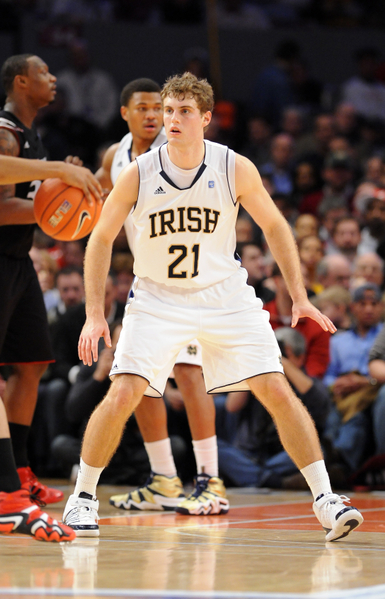The RTC Interview Series: One on One With Tim Abromaitis
Posted by rtmsf on May 27th, 2011Rush The Court is back with another edition of One on One: An Interview Series, which we will bring you periodically throughout the offseason. If you have any specific interview requests or want us to interview you, shoot us an email at rushthecourt@yahoo.com.
In a culture of one-and-dones and low academic performance ratings, it is always refreshing when there is an instance of a student-athlete who gets the job done on the playing court and goes above and beyond in the classroom. Notre Dame forward Tim Abromaitis thoroughly fits the description of one of those instances. Abromaitis has been a starting forward for Mike Brey’s Fighting Irish for the past two seasons and he flourished on the court as the team’s second leading scorer in both seasons as a starter. While it is well-known that Notre Dame carries stringent academic requirements for their student-athletes, the Big East Scholar-Athlete of the Year’s academic career is among the most impressive of all the students on the South Bend campus. The Unionville, Connecticut, forward graduated cum laude from the Mendoza School of Business (Business Week’s top rated undergraduate business school for the past two years) in just three years. Following his graduation, he enrolled in the school’s ultra-competitive one-year MBA program and will continue to take courses in 2011-12, his final season as a member of the Fighting Irish program. RTC correspondent Walker Carey recently had the pleasure of speaking to Abromaitis about his remarkable academic career and the plans for his future.
Rush the Court: For two years straight, Notre Dame has had the top-rated undergraduate business school in the country. Tell me a little bit about your major and the challenges you faced in such a competitive classroom setting.
Tim Abromaitis: As an undergraduate finance major, I took a variety of classes in the area such as Behavioral Finance and Investment Theory. With high-level classmates, it meant that courses would progress at a high speed and you had to stay on top of your game for every class.
RTC: Graduating in four years is an accomplishment, but graduating in three? How were you able to accomplish that? What was your workload like? Was it difficult to balance academics with basketball?
TA: Part of the reason why I was able to graduate early was the fact that I had a lot of credits from high school advanced placement tests. In addition to this, being on campus with the team for summer school and usually taking the normal full load of courses meant that I was able to graduate a year ahead of schedule. Balancing academics and basketball was challenging at times, especially when we would be traveling and missing classes. I have learned to manage my time well and focus on the right things to get the job done on the court and in the classroom.
RTC: When did you first set your sights on graduating early and applying to the MBA program?
TA: When our academic advisor Pat Holmes first received my AP scores when I was on campus for summer school before my freshman year, he pretty much immediately told me that I had the chance to graduate early. We did not seriously start talking about the MBA program until my sophomore year, and I started the application process at the beginning of my junior year.
RTC: I would imagine the MBA program is quite grueling. What was your normal day like balancing the program’s demands with the demands of being a major college basketball player?
TA: The MBA schedule is different because it has four modules, so classes are pretty quick. Class would be 10-12 and 1-3 from Monday through Thursday for most of the modules, with group meetings scheduled afterward a couple times per week normally. With practice and workouts at 3:30 or 4 every day, it would often mean I would have to go right back to the Mendoza building to work on group projects when basketball was over.
RTC: Despite having an undergraduate degree and an MBA already in hand, you still have one more year of college basketball eligibility remaining. What are your plans for the next school year?
TA: Next year, I will be an unclassified graduate student, so I will be able to take a variety of undergraduate classes that I had not had the opportunity to take in my first three years.
RTC: When you are done with basketball, what do you plan on doing with your degrees?
TA: After I am done playing, I will most likely go into corporate finance, which was my concentration in the MBA program. I am hoping to continue playing after I leave Notre Dame, but when that is over, I am sure Notre Dame and Mendoza will have prepared me well for my business career.












































